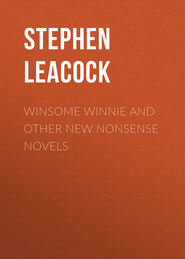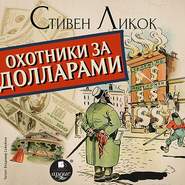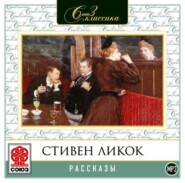По всем вопросам обращайтесь на: info@litportal.ru
(©) 2003-2025.
✖
The Hohenzollerns in America
Автор
Год написания книги
2019
Настройки чтения
Размер шрифта
Высота строк
Поля
"Toomuch," he said, "take our inquisitive friend out into the town; take him to the Bosphorous; take him to the island where the dogs are; take him anywhere." He paused to whisper a few instructions into the ear of the Secretary. "You understand," he said, "well, take him. As for me,"—he gave a great yawn as he shuffled away, "I am about to withdraw into my Inner Harem. Goodbye. I regret that I cannot invite you in."
"So do I," I said. "Goodbye."
IV.—Echoes of the War
1.—The Boy Who Came Back
The war is over. The soldiers are coming home. On all sides we are assured that the problem of the returned soldier is the gravest of our national concerns.
So I may say it without fear of contradiction,—since everybody else has seen it,—that, up to the present time, the returned soldier is a disappointment. He is not turning out as he ought. According to all the professors of psychology he was to come back bloodthirsty and brutalised, soaked in militarism and talking only of slaughter. In fact, a widespread movement had sprung up, warmly supported by the business men of the cities, to put him on the land. It was thought that central Nevada or northern Idaho would do nicely for him. At the same time an agitation had been started among the farmers, with the slogan "Back to the city," the idea being that farm life was so rough that it was not fair to ask the returned soldier to share it.
All these anticipations turn out to be quite groundless.
The first returned soldier of whom I had direct knowledge was my nephew Tom. When he came back, after two years in the trenches, we asked him to dine with us. "Now, remember," I said to my wife, "Tom will be a very different being from what he was when he went away. He left us as little more than a school boy, only in his first year at college; in fact, a mere child. You remember how he used to bore us with baseball talk and that sort of thing. And how shy he was! You recall his awful fear of Professor Razzler, who used to teach him mathematics. All that, of course, will be changed now. Tom will have come back a man. We must ask the old professor to meet him. It will amuse Tom to see him again. Just think of the things he must have seen! But we must be a little careful at dinner not to let him horrify the other people with brutal details of the war."
Tom came. I had expected him to arrive in uniform with his pocket full of bombs. Instead of this he wore ordinary evening dress with a dinner jacket. I realised as I helped him to take off his overcoat in the hall that he was very proud of his dinner jacket. He had never had one before. He said he wished the "boys" could see him in it. I asked him why he had put off his lieutenant's uniform so quickly. He explained that he was entitled not to wear it as soon as he had his discharge papers signed; some of the fellows, he said, kicked them off as soon as they left the ship, but the rule was, he told me, that you had to wear the thing till your papers were signed.
Then his eye caught a glimpse sideways of Professor Razzler standing on the hearth rug in the drawing room. "Say," he said, "is that the professor?" I could see that Tom was scared. All the signs of physical fear were written on his face. When I tried to lead him into the drawing room I realised that he was as shy as ever. Three of the women began talking to him all at once. Tom answered, yes or no,—with his eyes down. I liked the way he stood, though, so unconsciously erect and steady. The other men who came in afterwards, with easy greetings and noisy talk, somehow seemed loud-voiced and self-assertive.
Tom, to my surprise, refused a cocktail. It seems, as he explained, that he "got into the way of taking nothing over there." I noticed that my friend Quiller, who is a war correspondent, or, I should say, a war editorial writer, took three cocktails and talked all the more brilliantly for it through the opening courses of the dinner, about the story of the smashing of the Hindenburg line. He decided, after his second Burgundy, that it had been simply a case of sticking it out. I say "Burgundy" because we had substituted Burgundy, the sparkling kind, for champagne at our dinners as one of our little war economies.
Tom had nothing to say about the Hindenburg line. In fact, for the first half of the dinner he hardly spoke. I think he was worried about his left hand. There is a deep furrow across the back of it where a piece of shrapnel went through and there are two fingers that will hardly move at all. I could see that he was ashamed of its clumsiness and afraid that someone might notice it. So he kept silent. Professor Razzler did indeed ask him straight across the table what he thought about the final breaking of the Hindenburg line. But he asked it with that same fierce look from under his bushy eyebrows with which he used to ask Tom to define the path of a tangent, and Tom was rattled at once. He answered something about being afraid that he was not well posted, owing to there being so little chance over there to read the papers.
After that Professor Razzler and Mr. Quiller discussed for us, most energetically, the strategy of the Lorraine sector (Tom served there six months, but he never said so) and high explosives and the possibilities of aerial bombs. (Tom was "buried" by an aerial bomb but, of course, he didn't break in and mention it.)
But we did get him talking of the war at last, towards the end of the dinner; or rather, the girl sitting next to him did, and presently the rest of us found ourselves listening. The strange thing was that the girl was a mere slip of a thing, hardly as old as Tom himself. In fact, my wife was almost afraid she might be too young to ask to dinner: girls of that age, my wife tells me, have hardly sense enough to talk to men, and fail to interest them. This is a proposition which I think it better not to dispute.
But at any rate we presently realized that Tom was talking about his war experiences and the other talk about the table was gradually hushed into listening.
This, as nearly as I can set it down, is what he told us: That the French fellows picked up baseball in a way that is absolutely amazing; they were not much good, it seems, at the bat, at any rate not at first, but at running bases they were perfect marvels; some of the French made good pitchers, too; Tom knew a poilu who had lost his right arm who could pitch as good a ball with his left as any man on the American side; at the port where Tom first landed and where they trained for a month they had a dandy ball ground, a regular peach, a former parade ground of the French barracks. On being asked WHICH port it was, Tom said he couldn't remember; he thought it was either Boulogne or Bordeaux or Brest,—at any rate, it was one of those places on the English channel. The ball ground they had behind the trenches was not so good; it was too much cut up by long range shells. But the ball ground at the base hospital (where Tom was sent for his second wound) was an A1 ground. The French doctors, it appears, were perfectly rotten at baseball, not a bit like the soldiers. Tom wonders that they kept them. Tom says that baseball had been tried among the German prisoners, but they are perfect dubs. He doubts whether the Germans will ever be able to play ball. They lack the national spirit. On the other hand, Tom thinks that the English will play a great game when they really get into it. He had two weeks' leave in London and went to see the game that King George was at, and says that the King, if they will let him, will make the greatest rooter of the whole bunch.
Such was Tom's war talk.
It grieved me to note that as the men sat smoking their cigars and drinking liqueur whiskey (we have cut out port at our house till the final peace is signed) Tom seemed to have subsided into being only a boy again, a first-year college boy among his seniors. They spoke to him in quite a patronising way, and even asked him two or three direct questions about fighting in the trenches, and wounds and the dead men in No Man's Land and the other horrors that the civilian mind hankers to hear about. Perhaps they thought, from the boy's talk, that he had seen nothing. If so, they were mistaken. For about three minutes, not more, Tom gave them what was coming to them. He told them, for example, why he trained his "fellows" to drive the bayonet through the stomach and not through the head, that the bayonet driven through the face or skull sticks and,—but there is no need to recite it here. Any of the boys like Tom can tell it all to you, only they don't want to and don't care to.
They've got past it.
But I noticed that as the boy talked,—quietly and reluctantly enough,—the older men fell silent and looked into his face with the realisation that behind his simple talk and quiet manner lay an inward vision of grim and awful realities that no words could picture.
I think that they were glad when we joined the ladies again and when Tom talked of the amateur vaudeville show that his company had got up behind the trenches.
Later on, when the other guests were telephoning for their motors and calling up taxis, Tom said he'd walk to his hotel; it was only a mile and the light rain that was falling would do him, he said, no harm at all. So he trudged off, refusing a lift.
Oh, no, I don't think we need to worry about the returned soldier. Only let him return, that's all. When he does, he's a better man than we are, Gunga Dinn.
2.—The War Sacrifices of Mr. Spugg
Although we had been members of the same club for years,
I only knew Mr. Spugg by sight until one afternoon when I heard him saying that he intended to send his chauffeur to the war.
It was said quite quietly,—no bombast or boasting about it. Mr. Spugg was standing among a little group of listening members of the club and when he said that he had decided to send his chauffeur, he spoke with a kind of simple earnestness, a determination that marks the character of the man.
"Yes," he said, "we need all the man power we can command. This thing has come to a showdown and we've got to recognise it. I told Henry that it's a showdown and that he's to get ready and start right away."
"Well, Spugg," said one of the members "you're certainly setting us a fine example."
"What else can a man do?" said Mr. Spugg.
"When does your chauffeur leave?" asked another man.
"Right away. I want him in the firing line just as quick as I can get him there."
"It's a fine thing you're doing, Spugg," said a third member, "but do you realise that your chauffeur may be killed?"
"I must take my chance on that," answered Mr. Spugg, firmly. "I've thought this thing out and made up my mind: If my chauffeur is killed, I mean to pay for him,—full and adequate compensation. The loss must fall on me, not on him. Or, say Henry comes back mutilated,—say he loses a leg,—say he loses two legs,—"
Here Mr. Spugg looked about him at his listeners, with a look that meant that even three legs wouldn't be too much for him.
"Whatever Henry loses I pay for. The loss shall fall on me, every cent of it."
"Spugg," said a quiet looking, neatly dressed man whom I knew to be the president of an insurance company and who reached out and shook the speaker by the hand, "this is a fine thing you're doing, a big thing. But we mustn't let you do it alone. Let our company take a hand in it. We're making a special rate now on chauffeurs, footmen, and house-servants sent to the war, quite below the rate that actuarial figures justify. It is our little war contribution," he added modestly. "We like to feel that we're doing our bit, too. We had a chauffeur killed last week. We paid for him right off without demur,—waived all question of who killed him. I never signed a check (as I took occasion to say in a little note I wrote to his people) with greater pleasure."
"What do you do if Henry's mutilated?" asked Mr. Spugg, turning his quiet eyes on the insurance man and facing the brutal facts of things without flinching. "What do you pay? Suppose I lose the use of Henry's legs, what then?"
"It's all right," said his friend. "Leave it to us.
Whatever he loses, we make it good."
"All right," said Spugg, "send me round a policy. I'm going to see Henry clear through on this."
It was at this point that at my own urgent request I was introduced to Mr. Spugg, so that I might add my congratulations to those of the others. I told him that I felt, as all the other members of the club did, that he was doing a big thing, and he answered again, in his modest way, that he didn't see what else a man could do.
"My son Alfred and I," he said, "talked it over last night and we agreed that we can run the car ourselves, or make a shot at it anyway. After all, it's war time."
"What branch of the service are you putting your chauffeur in?" I asked.
"I'm not sure," he answered. "I think I'll send him up in the air. It's dangerous, of course, but it's no time to think about that."
So, in due time, Mr. Spugg's chauffeur, Henry, went overseas. He was reported first as in England. Next he was right at the front, at the very firing itself. We knew then,—everybody in the club knew that Mr. Spugg's chauffeur might be killed at any moment. But great as the strain must have been, Spugg went up and down to his office and in and out of the club without a tremor. The situation gave him a new importance in our eyes, something tense.
"This seems to be a terrific business," I said to him one day at lunch, "this new German drive."
"My chauffeur," said Mr. Spugg, "was right in the middle of it."
"He was, eh?"
"Yes," he continued, "one shell burst in the air so near him it almost broke his wings."














